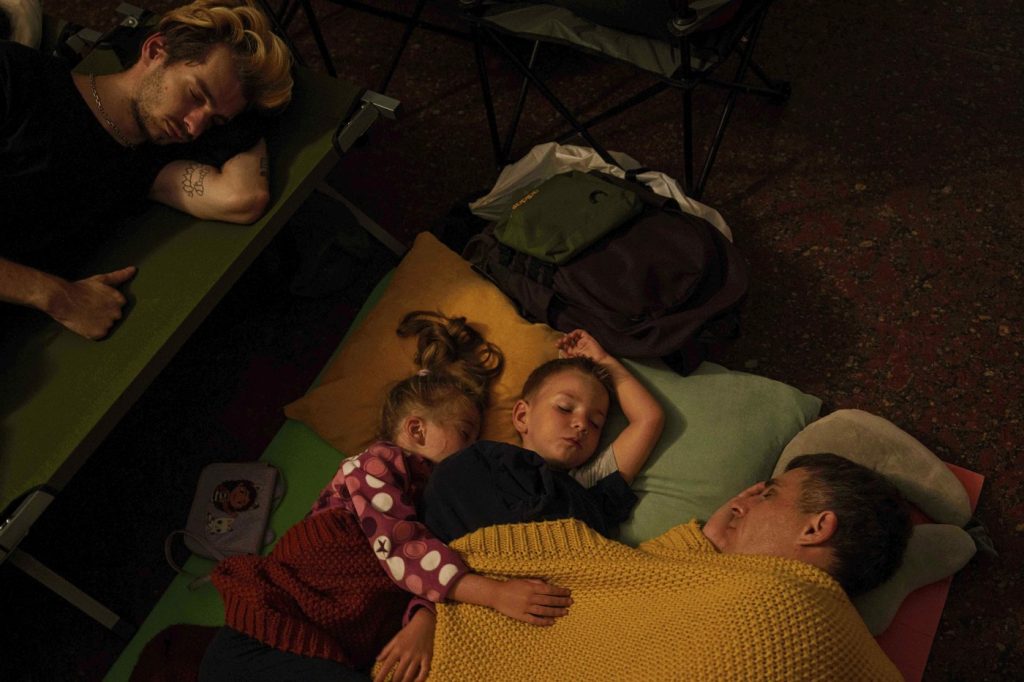KYIV, Ukraine – By day, the Ukrainian capital, Kyiv, is bustling with life, characterized by crowded metros, dog walkers, and children playing in playgrounds. However, the nights transform into a battlefield as Russia intensifies its drone and missile assaults, compelling much of the population to seek refuge underground for safety.
The frequency and severity of nighttime attacks have escalated as the fourth year of the full-scale invasion unfolds. Recent reports indicate that the number of drones used in attacks has sometimes surpassed 700, with authorities suggesting that swarms of 1,000 drones could soon become commonplace.
Residents of Kyiv report that these recent attacks are among the most terrifying experienced throughout the conflict. Even those who previously disregarded air raid sirens are now hastening to bomb shelters in the subway system to protect themselves. Twenty-five-year-old Karyna Holf described the sharp contrast between day and night, noting how, during the day, she can enjoy simple pleasures like coffee with friends, but by night, the sound of approaching drones and missiles instills dread of impending death.
A Russian attack on Thursday severely damaged Holf's apartment. While she was near a window, she heard the whistling of an incoming missile, and moments later, her home was reduced to rubble. Fortunately, she was one of the lucky ones who survived the attack.
The ever-present threat of death has led to a culture of dark humor among the residents. While fear paralyzes many at night, during the day, they joke about their survival habits, likening their daily experiences to a computer game where they try to stay functional against the odds.
The cacophony of buzzing drones, punctuated by explosions and the sounds of air defense systems, can persist for hours, leaving many residents chronically sleep-deprived. As the drones cover sweeping areas of the city, explosions light up the darkened sky, filling the air with smoke and the distinct smell of gunpowder. Since the start of the year, over 800 sites in Kyiv have been struck, including more than 600 residential buildings. The head of the Kyiv city administration, Tymur Tkachenko, emphasized the deliberate targeting of civilian infrastructure as a tactic to instill fear and increase civilian casualties.
Russia maintains that it targets military installations; however, numerous instances throughout the war have shown ample evidence of civilian areas being hit. Despite the terror, the attacks have fostered a sense of solidarity among Kyiv residents, who proudly share on social media that they can still enjoy their daily routines without disruption.
Although many face the psychological impact of the ongoing terror, some residents, like 35-year-old Danylo Kuzemskyi, express resilience. His apartment was destroyed in a previous strike, yet he believes that the terror is designed not only to attack military targets but to demoralize the entire Ukrainian populace. While he previously sought shelter during attacks, he now prioritizes sleep over safety, asserting his intent to remain undeterred.
For 23-year-old Oleksandra Umanets, who has a 10-month-old son, the subway shelter appears to be a safer option compared to their own home at night. Typically around 5 a.m., she emerges from the shelter with her child, returns home, and lies down to sleep, relieved to find her baby smiling upon waking. Despite the chaos, she observes children playing and mothers smiling during the day, suggesting a semblance of normalcy. However, when night falls, she prepares her family for the sirens that signal impending danger, always ready to seek cover.
Umanets poignantly reflects on the stakes, saying, “When it’s about you — that’s one thing. But when it’s about your child, for what?” She expresses anger about the threat her son faces simply for being born in Ukraine, underscoring the tragic reality of their existence in a war-torn country.











